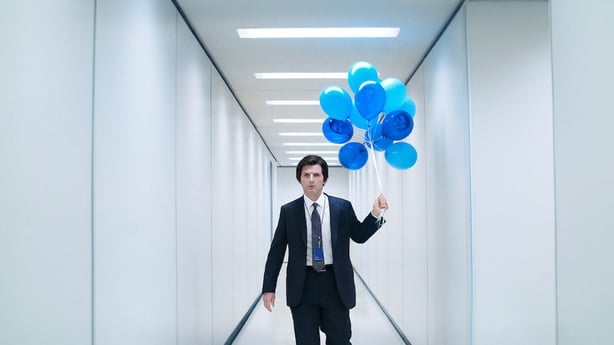Like almost everyone this month, I've been transfixed by Adolescence, now out on Netflix. Co-created by and starring Stephen Graham, the show follows a family in Northern England whose world is turned upside down when their 13-year-old son is accused of violently murdering a young girl in his class.
It’s a technical masterpiece—each episode filmed in a single take—and an acting masterclass, with a particularly strong turn from Owen Cooper, the child star at the centre of it all, in his first professional role.
The show has been universally acclaimed and has sparked a wider conversation about knife crime and the radicalisation of young men online. So with all this praise and important discourse surrounding it, why does it already feel like, barely two weeks after its premiere, the conversation has come and gone?
Because of the Netflix model—dropping all episodes at once.
I get the excitement. When Netflix first entered the streaming game, full seasons of House of Cards or Orange Is the New Black available to watch at your leisure was a huge selling point. But the media landscape—and the sheer volume of content being produced—has changed drastically since then. It’s become nearly impossible to keep up with everything. And when a great show like Adolescence comes along, it’s almost ruined before you’ve even had the chance to start it by people who’ve already binged the whole thing on day one.
The day after the show dropped, my feeds on X and TikTok were plastered with spoilers—screen grabs, full scenes, and key moments—before I’d even hit play. Of course, it wasn’t just social media. By the weekend, every major outlet and magazine felt comfortable publishing pieces that completely gave away the show’s twists and turns.
First acting job.
— Netflix UK & Ireland (@NetflixUK) March 20, 2025
First episode to be filmed.
First time being on set.
AND HE DELIVERS THIS!
Owen Cooper, you're a star. #Adolescence pic.twitter.com/dL9fvDuGdF
Are we now expected, as viewers, to be hyper-aware of every new release and ready to binge-watch hours of content the moment it becomes available? What happened to enjoying television—actually sitting with it over time? When did it become a race to the finish line? Isn’t the whole point of TV to spend time with characters, mull over plot points, and gradually build a relationship with the story?
When every episode drops at once and there’s a constant risk of spoilers, watching TV becomes less about being immersed in a world and more about simply finding out how it ends. Shouldn’t we be allowed to enjoy the journey?

As I’ve discussed Adolescence with friends (always in vague terms—because no group chat is ever on the same episode—it’s all "I think I’ve seen what you’re talking about" and "Don’t say anything yet, I’m saving that for tomorrow"), I can’t help but think how much more impact the show could’ve had with a traditional weekly rollout. It could have become true appointment viewing.
I've always loved TV, and it pains me to see it treated as something disposable.
Imagine if Adolescence had aired over four weeks. Week one could have given audiences time to fully absorb the horror the family experiences in the premiere. In week two, we could have reflected on how the show’s themes relate to children in school—not just on screen, but in real life. Episode three could’ve sparked a national conversation about what it means to be a young boy in 2025, and how the internet is shaping them. The finale could’ve left room for genuine reflection on the growing normalisation of youth violence.
Instead, with everything dropped at once, the discussions become muddled—and over before they’ve really begun. Is that any way to treat the art we consume?
Running concurrently with Adolescence are The White Lotus and Severance, both airing weekly—a fact that, I believe, has not only added to their appeal but elevated their cultural impact. Would The White Lotus have made the same waves if all episodes had dropped at once? The joy of spending time with its sprawling cast each week draws people in and fuels speculation, memes, and discussion that last long after each episode airs.
I'm still processing the Sam Rockwell monologue in The White Lotus but it might end up as one of my favorite pieces of TV acting this year. pic.twitter.com/R6Et5cFGJY
— Brandon Lewis (@blewis1103) March 17, 2025
Look at how quotes and moments from The White Lotus live on between seasons. Do shows dropped all at once inspire that same level of engagement? When we get just one episode a week, we have the time to truly examine and connect with what we're watching. And, most importantly, aren’t we better off having eight weeks of Parker Posey and Carrie Coon on our screens instead of just one day's worth? I know I think so.
if you're not parker posey saying lorazepam then please stop talking
— Carrie Wittmer 👻 (@carriesnotscary) March 10, 2025
Severance, which just wrapped its second season on Apple TV+, has also massively benefited from the weekly format. Fans dissect every frame, pore over theories, and savour every moment. That level of investment doesn’t happen when episodes are consumed in a single sitting.
I’ve always loved TV, and it pains me to see it treated as something disposable. Think about it—would anyone have cared what actually happened on the island if Lost hadn’t been paced the way it was? Would Don Draper’s journey even matter if Mad Men was just background noise over a lazy weekend?
TV is supposed to be appointment viewing. I’d hate to see all that great storytelling thrown away in the name of convenience.
The views expressed here are those of the author and do not represent or reflect the views of RTÉ


